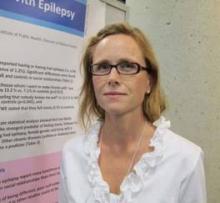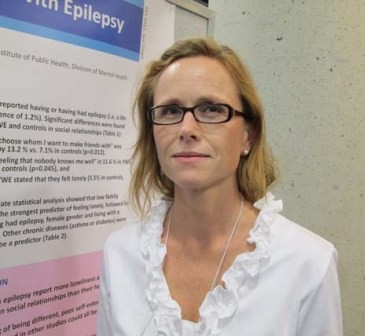User login
A higher proportion of youth with epilepsy reports more bouts of loneliness and problems in social relationships compared with their healthy peers, results from a large Norwegian study showed.
The findings underscore the importance of asking youth with epilepsy about the impact the condition has on their lives, Dr. Kristin Alfstad said in an interview during a poster session at the annual meeting of the American Epilepsy Society. "To get them to open up: I often ask, ‘How do you like school? Are things okay at school?’ If they don’t function well in school, that’s often a sign of trouble. I’ll also ask them, ‘Do you have a best friend?’ "
Dr. Alfstad, a neurologist with the division of surgery and clinical neuroscience at Oslo University Hospital, Norway, and her associates previously published data showing a higher prevalence of symptoms of psychological distress and risk-taking behavior in youth with epilepsy compared with controls (Epilepsia 2011;52:1231-8; Acta. Neurol. Scand. Suppl. 2011;191:12-7). The purpose of the current analysis was to investigate how youth with epilepsy aged 16-19 years perceive their social relationships.
The researchers analyzed survey responses from 10,571 youth who were asked in 2002 to describe their feelings concerning social relationships. Questions could be answered as correct, partly correct, or not correct, and the researchers used chi-square analysis for testing categorical variables.
Next, they conducted a multivariate analysis, with feeling lonely as the dependent variable and having/having had epilepsy, gender, low family income, and living with a single parent as independent risk factors.
Of the 10,571 respondents, 114 reported having or having had epilepsy (1.2%). Compared with controls, a higher proportion of youth with epilepsy identified with the question: "I cannot choose whom I want to make friends with" (13.2% vs. 7.1%; P = .012), and "I have a feeling that nobody knows me well" (11.6% vs. 6.8%; P = .045). In addition, a higher proportion of youth with epilepsy stated that they felt lonely (10.7%, compared with 5.5% among controls).
Multivariate analysis revealed that low family income was the strongest predictor of feeling lonely (odds ratio 2.3; P less than .001), followed by having/having had epilepsy (OR 2.0; P = .026), female gender (OR 1.4; P less than .001), and living with a single parent (OR 1.3; P = .019).
The study was funded by the Norwegian Institute of Public Health. Dr. Alfstad said she had no relevant financial disclosures.
A higher proportion of youth with epilepsy reports more bouts of loneliness and problems in social relationships compared with their healthy peers, results from a large Norwegian study showed.
The findings underscore the importance of asking youth with epilepsy about the impact the condition has on their lives, Dr. Kristin Alfstad said in an interview during a poster session at the annual meeting of the American Epilepsy Society. "To get them to open up: I often ask, ‘How do you like school? Are things okay at school?’ If they don’t function well in school, that’s often a sign of trouble. I’ll also ask them, ‘Do you have a best friend?’ "
Dr. Alfstad, a neurologist with the division of surgery and clinical neuroscience at Oslo University Hospital, Norway, and her associates previously published data showing a higher prevalence of symptoms of psychological distress and risk-taking behavior in youth with epilepsy compared with controls (Epilepsia 2011;52:1231-8; Acta. Neurol. Scand. Suppl. 2011;191:12-7). The purpose of the current analysis was to investigate how youth with epilepsy aged 16-19 years perceive their social relationships.
The researchers analyzed survey responses from 10,571 youth who were asked in 2002 to describe their feelings concerning social relationships. Questions could be answered as correct, partly correct, or not correct, and the researchers used chi-square analysis for testing categorical variables.
Next, they conducted a multivariate analysis, with feeling lonely as the dependent variable and having/having had epilepsy, gender, low family income, and living with a single parent as independent risk factors.
Of the 10,571 respondents, 114 reported having or having had epilepsy (1.2%). Compared with controls, a higher proportion of youth with epilepsy identified with the question: "I cannot choose whom I want to make friends with" (13.2% vs. 7.1%; P = .012), and "I have a feeling that nobody knows me well" (11.6% vs. 6.8%; P = .045). In addition, a higher proportion of youth with epilepsy stated that they felt lonely (10.7%, compared with 5.5% among controls).
Multivariate analysis revealed that low family income was the strongest predictor of feeling lonely (odds ratio 2.3; P less than .001), followed by having/having had epilepsy (OR 2.0; P = .026), female gender (OR 1.4; P less than .001), and living with a single parent (OR 1.3; P = .019).
The study was funded by the Norwegian Institute of Public Health. Dr. Alfstad said she had no relevant financial disclosures.
A higher proportion of youth with epilepsy reports more bouts of loneliness and problems in social relationships compared with their healthy peers, results from a large Norwegian study showed.
The findings underscore the importance of asking youth with epilepsy about the impact the condition has on their lives, Dr. Kristin Alfstad said in an interview during a poster session at the annual meeting of the American Epilepsy Society. "To get them to open up: I often ask, ‘How do you like school? Are things okay at school?’ If they don’t function well in school, that’s often a sign of trouble. I’ll also ask them, ‘Do you have a best friend?’ "
Dr. Alfstad, a neurologist with the division of surgery and clinical neuroscience at Oslo University Hospital, Norway, and her associates previously published data showing a higher prevalence of symptoms of psychological distress and risk-taking behavior in youth with epilepsy compared with controls (Epilepsia 2011;52:1231-8; Acta. Neurol. Scand. Suppl. 2011;191:12-7). The purpose of the current analysis was to investigate how youth with epilepsy aged 16-19 years perceive their social relationships.
The researchers analyzed survey responses from 10,571 youth who were asked in 2002 to describe their feelings concerning social relationships. Questions could be answered as correct, partly correct, or not correct, and the researchers used chi-square analysis for testing categorical variables.
Next, they conducted a multivariate analysis, with feeling lonely as the dependent variable and having/having had epilepsy, gender, low family income, and living with a single parent as independent risk factors.
Of the 10,571 respondents, 114 reported having or having had epilepsy (1.2%). Compared with controls, a higher proportion of youth with epilepsy identified with the question: "I cannot choose whom I want to make friends with" (13.2% vs. 7.1%; P = .012), and "I have a feeling that nobody knows me well" (11.6% vs. 6.8%; P = .045). In addition, a higher proportion of youth with epilepsy stated that they felt lonely (10.7%, compared with 5.5% among controls).
Multivariate analysis revealed that low family income was the strongest predictor of feeling lonely (odds ratio 2.3; P less than .001), followed by having/having had epilepsy (OR 2.0; P = .026), female gender (OR 1.4; P less than .001), and living with a single parent (OR 1.3; P = .019).
The study was funded by the Norwegian Institute of Public Health. Dr. Alfstad said she had no relevant financial disclosures.
AT THE ANNUAL MEETING OF THE AMERICAN EPILEPSY SOCIETY
Major Finding: Compared with their healthy peers, a higher proportion of youth with epilepsy reported that they felt lonely (10.7% vs. 5.5%). On multivariate analysis, the two strongest predictors of feeling lonely were low family income (odds ratio 2.3; P less than .001) and having/having had epilepsy (OR 2.0; P = .026).
Data Source: A study of 10,571 Norwegian youth who were asked in 2002 to describe their feelings concerning social relationships.
Disclosures: The study was funded by the Norwegian Institute of Public Health. Dr. Alfstad said she had no relevant financial disclosures.

